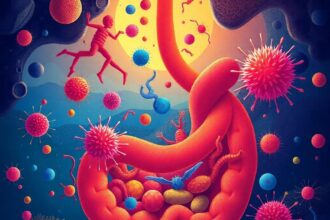Exploring the profound connection between gut microbiota and mental health, backed by research from ‘Nature Microbiology’ and expert insights.
Recent studies reveal how gut microbiota influences mental health, linking gut dysbiosis to conditions like anxiety and depression.
The Gut-Brain Axis: A Two-Way Communication System
The gut-brain axis is a complex bidirectional communication network linking the enteric nervous system of the gut with the central nervous system. This connection explains why gastrointestinal issues often accompany mental health disorders and vice versa.
Scientific Evidence from Nature Microbiology
A 2019 study published in Nature Microbiology
found distinct gut microbiome patterns in individuals with depression. The research team, led by Jeroen Raes, identified specific microbial taxa that were consistently depleted in depressed patients across international cohorts.
Expert Insights
Dr. Emeran Mayer, a gastroenterologist and author of The Mind-Gut Connection
, states: Our gut microbes produce neurotransmitters identical to those made by our brain. About 90% of serotonin, a key mood regulator, is actually produced in the gut.
Gut Dysbiosis and Mental Health Conditions
Gut dysbiosis – an imbalance in gut microbiota – has been linked to several mental health conditions:
Anxiety
A 2021 meta-analysis in General Psychiatry
found that probiotic supplementation significantly reduced anxiety symptoms, particularly in clinical populations.
Depression
Research from the APC Microbiome Ireland showed that specific gut bacteria can produce GABA, a neurotransmitter that regulates depression.
Nurturing Your Gut Microbiome
Probiotic-Rich Foods
- Yogurt with live cultures
- Kefir
- Sauerkraut
- Kimchi
- Miso
Prebiotic Foods
- Garlic
- Onions
- Bananas
- Asparagus
- Whole grains
Lifestyle Factors
Regular exercise, adequate sleep, and stress management techniques like meditation all contribute to a healthier gut microbiome.




